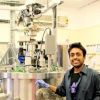
Risalat Khan
- Course: Condensed Matter Physics PhD
Which year of PhD are you currently completing?
I'm in my third year.
What is your research project about?
The project is about current-driven magnetic domain wall dynamics utilising spin-orbit torques. In a simpler way, the research focuses on developing next generation low power memory and logic devices by manipulating the electron spin, which is an intrinsic quantum property of electrons. These devices are thus termed as spintronic devices, as opposed to electronic devices.
What makes you passionate about what you are studying?
It is not only useful but also immensely interesting to know how nature works. This forms the basis of why I study physics. I can’t imagine myself not trying to know how things are working around me. Nature can be complex but it’s pretty satisfying figuring out why it works the way it does.
Why did you decide to do a research degree?
Pursuing a research degree is quite challenging which is actually very helpful in developing a wide range of skills, both in a personal and professional way. These skills will be highly beneficial for my future career. Furthermore, doing a research degree allows me to stay well connected with the scientific community.
Why Leeds?
The city of Leeds is very vibrant and multicultural. Yorkshire people are very friendly and fun to be with. The city is well connected with the university, and in general as a whole. You can find almost anything you need here in Leeds.
What do you like best about your School?
The working environment is very friendly where all the different research groups work together, collaborate and are respectful towards each other. The administrative staff are very helpful who are ready to give advice and help in probably any type of matter, let it be academic or non-academic issues.
What has been the most challenging aspect of your PhD?
A physics PhD is very intensive and demanding. Apart from working hard and long for your research, you also need to invest a lot of time in reading, both to understand your research and also to stay up-to-date with current findings around the globe. Thus, efficient time management is essential.
What has been the hardest thing about living abroad?
Probably not to be able to go back home for a quick visit if I miss my family and friends. Home is far away and so it usually takes advanced planning and also can be quite expensive. So the frequency of visit is quite low; once a year maybe.
What have you particularly missed back home?
During a particular event or phase in life, both positive or negative, one likes to share it with family and friends, so as to enhance the good feeling or relieve the bad ones. These times can be as simple as catching a bad flu, or a small success of the day. However, I would like to say that I have wonderful friends here who are fun and supportive and I am very thankful to them.
What are the main skills which you have developed?
Analytical abilities, efficient work and time management, communication skills, multi-tasking, etc.
What have you enjoyed most about your PhD?
Studying about the fundamentals of nature in a professional way applying proper methodology is indeed very enjoying.
What would you say to other international research students thinking of coming to Leeds University to study for a PhD?
The University of Leeds is very structured. It has a vibrant and centralised campus with proper support for students. It is a research oriented university and thrives on cutting-edge developments which allows it to enjoy a high research and academic reputation in the world stage.

